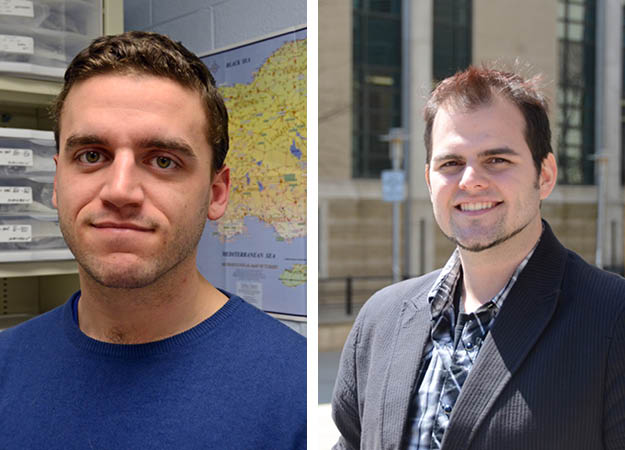USRA recipients gearing up for Mediterranean research trip

Sean Doyle (left) and Murray Clayton are travelling to Italy and Greece, respectively, to complete archaeological research projects funded through Undergraduate Student Research Awards.
Spending a few weeks in the Mediterranean is a dream come true for two McMaster anthropology undergraduate students.
It’s not the warm Mediterranean Sea and its sun-kissed beaches that appeal to Murray Clayton and Sean Doyle, however. The two are travelling to Italy and Greece, respectively, to complete archaeological research projects funded through Undergraduate Student Research Awards.
“This is a real game changer,” said Doyle, of the opportunity to use a $6,000 USRA grant to complete his research. “To get this great opportunity to learn and travel while earning some income means a lot.”
Doyle’s research involves using a geographic information system (GIS) program to track artifacts, specifically stone tools and associated manufacturing debris, found within a small survey area that contains several archaeological sites. The information will later be used to digitally reconstruct areas of activity.
“I’ll create a map that shows the different levels of the site,” said Doyle. “There will be a base map, an elevation map and a map showing where artifacts have been found. These maps will contain layers that show vegetation and soil type and other environmental and anthropological features that may have affected the distribution of artifacts since their initial deposition.”
Clayton’s research, on the other hand, will involve examining bones excavated from a Roman cemetery in an area known as Vangari, which is near Gravina in Puglia, Italy.
Once the bones are cleaned and catalogued, Clayton — who will be working with McMaster associate professor Tracy Prowse — will try to determine whether the bones belonged to male or females and the role their owners had while living in the village.
“It will be a great experience to work with someone who has done this type of work for 10 years,” said Clayton of Prowse’s involvement in his project.
Clayton said the USRA grant, which is administered through the Faculty of Social Sciences’ Experiential Education office, will provide invaluable experience.
“It was so easy to fill out the proposal and application and you can get so much out of it,” he explained.
Doyle, who last year travelled to the Neolithic site of Çatalhöyük in Turkey through an Experiential Education Student Experience Grant, agreed.
“I couldn’t afford all of these opportunities on my own,” he said. “Funding through Experiential Education has opened a lot of doors for me.”

